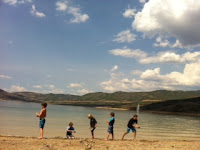 The summer got away from us – one morning our grandsons were pitching sand balls into the lake, the next afternoon they were preparing their backpacks for school. Whereas Monday’s blog post focused on kids’ stress that comes from media coverage of trauma, there are lots of other situations that can make kids feel anxious – like the first day of school.
The summer got away from us – one morning our grandsons were pitching sand balls into the lake, the next afternoon they were preparing their backpacks for school. Whereas Monday’s blog post focused on kids’ stress that comes from media coverage of trauma, there are lots of other situations that can make kids feel anxious – like the first day of school.
Kids respond differently and the impact of any stressor depends on their personality, maturity, and coping mechanisms. Some have trouble explaining how they feel so it’s not always obvious, although tears, withdrawal or irritability are often clues. The behavior of others might not change yet they feel nervous or scared. And stress can affect physical well being, with exacerbation of asthma, stomachaches or sleep disturbances.
What can you do to help?
Often the best predictor of how children cope is how well their parents cope with stress. They are often sensitive and struggle to understand their reactions. They may feel uncomfortable or embarrassed, too big to admit they’re worried. Encourage them to talk about how they feel and not keep bad thoughts inside.
Their relationships matter. Children feel better about themselves when they are getting along well with you. And kids who do not have close friendships are at higher risk for developing stress-related problems. No matter how busy their schedule, kids of all ages need time to play with others and relax. Play helps them learn about their world, explore ideas and soothe themselves.
Kids need support, but also space to work things out. You can’t walk a tightrope for them. Sometimes they need to fall, feel disappointment, and learn from their mistakes. Parents have to acknowledge their own anxiety and find the courage to step back. Remember that they thrive best in an environment that is reliable, consistent, and non-interfering. Their job is to grow, yours is to control worry so that it doesn’t get in the way as they move toward autonomy.










2 Responses to Helping Kids Feel Secure